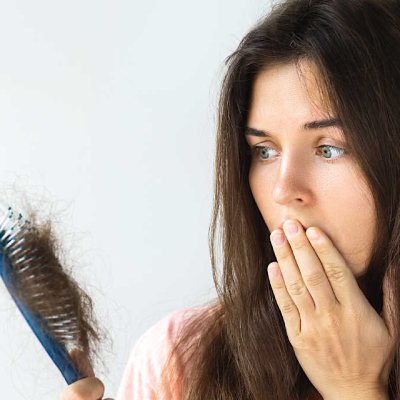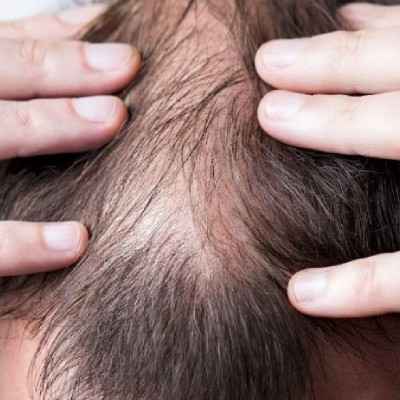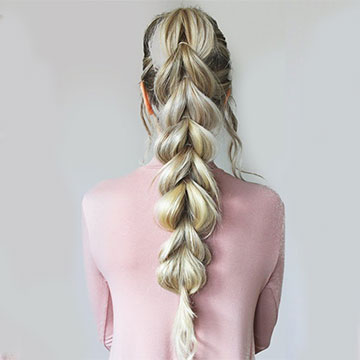Effective Ways to Deal With Postpartum Hair Loss

13 May 2024

moneshairexperts

Being a mother brings unfathomable bliss! When you hold your child in your arms, all the discomfort and issues you experienced during the pregnancy phase vanishes. Postpartum hair loss is a serious problem that most women experience as they settle into a routine that mostly entails caring for their kids. When your hair starts to thin a few weeks (8–12 weeks) following your child's birth, it can come as an unwelcome surprise. Hair could clog your shower drain or be seen on your bedding, clothes, or other surfaces.
It's entirely natural for hair loss to be increasing. It is brought on by estrogen levels rising back to pre-pregnancy levels. Read ahead as we explain all there is to understand postpartum hair loss and to effectively deal with it.
What is Postpartum Hair Loss?
The extreme hair loss that occurs a few months after giving birth is known as postpartum hair loss. Hormone changes that take place before, during, and after pregnancy are the cause. It occurs because hormone levels return to those before pregnancy, which enables hair to resume its more normal cycle of growth and shedding. It is the phenomenon referred to as postpartum hair loss. Anyone who has gone through it knows that it can be a lot, so while the volume of hair that falls out may first seem scary, in time, it will stop.Postpartum Hair Loss Signs
The biggest indicator of hair loss after pregnancy is finding loose hair on your brush, pillow, or shower floor. More stray hair may adhere to your clothing. Seek help from a hair expert if hair loss is excessive. In extreme situations, your hair doctor may also suggest a hair transplant or other hair treatments, so it is important to check your scalp.What Causes Postpartum Hair Loss?
Postpartum hair loss can result from a few different factors. These consist of the following:- A Drop in Estrogen Following Childbirth Hair follicles enter the resting stage rather than the growth stage due to decreased estrogen. These hairs might fall out months from childbirth. Mainly postpartum hair loss is brought on by changes in the hormone estrogen during and after pregnancy. The last trimester of pregnancy sees an increase in estrogen levels. It stops the usual hair shedding. During this time, you could notice that your hair is thick and luxurious. Estrogen levels decrease following delivery. As a result, many hairs start their resting period of growth. This hair begins to fall out after several months.
- Underlying Circumstances Postpartum hair loss can occasionally be caused by factors other than only a drop in estrogen; these additional factors might exacerbate the condition. Hair loss can also be caused by thyroid issues, anemia, stress, and hormonal imbalances, which may require further testing and hair loss treatments such as female hair transplant.
How does Hormone Affect Your Hair Growth?
When Does Postpartum Hair Loss Start?
Postpartum hair loss may start two to four months after giving birth. Every woman's experience with hair loss will be unique, and it is not always correlated with the quantity or quality of her prenatally grown hair. If you have longer hair or have a lot of hair growth during pregnancy, your hair fall can appear more severe.How Long Does Postpartum Hair Loss Last?
You might be wondering, "when does postpartum hair loss stop" now that you are aware of postpartum hair loss causes and the timing of its onset. It's crucial to remember that postpartum hair loss is just transient. 4 months postpartum hair loss is relatively typical for many women, and postpartum hair loss can last for several months. Normal hair growth. patterns usually resume six months after giving birth, while some women may continue to lose hair up to a year after giving birth. If you think you have severe postpartum hair loss or the symptoms last longer than a year, go to your doctor.Dealing with Postpartum Hair Loss
You cannot stop postpartum hair loss right away because it is a natural side effect of your fluctuating hormone levels. You can take measures to lessen the impacts of postpartum hair loss and support healthy hair growth, though. Following are some things you can do regarding hair loss after having birth:- Required Vitamins A diversified diet shouldn't be replaced by vitamins, especially if you're a new mom with a child. It could be a supplement if your diet needs to be balanced. Vitamins are crucial for overall health, even if they haven't been proven to affect hair loss in particular. After your baby is delivered, continuing your prenatal vitamins is frequently advised.
- Be gentle with your Hair. To avoid after pregnancy hair fall, exercise extra caution. Use a good conditioner, a wide-toothed comb, and only shampoo when necessary (if you have time to shampoo at all!). It will help to reduce tangling.
- Pick the Appropriate Accessories. Instead of using elastic bands to hold hair up, use scrunchies or barrettes, and avoid pulling hair into tight ponytails.
- Keep a Balanced Diet. Maintaining a balanced diet is crucial for our overall health and well-being. A nutritious diet, especially for postpartum women, can aid in general recovery and halt the progression of postpartum hair loss. Ensure your diet contains vitamins and minerals, typically fresh fruit, whole grains, and vegetables. Remember to sip on water frequently during the day to stay hydrated.
- Reduce the Heat. Avoid using any heat on your hair to prevent further damage. Avoid using flat irons, curling irons, and blow dryers for some time.
- Avoid Chemicals Postpone getting any chemical treatments done, such as getting your hair straightened, permed, or highlighted until the shedding stops.
- If you are losing a lot of hair, consult your doctor. Hair loss after childbirth could be a sign of postpartum thyroiditis if it's coupled with other symptoms of female pattern baldness. Seek help from a hair expert if the hair fall is excessive and does not stop after a while. In extreme cases, your hair doctor might suggest a hair transplant or other hair regrowth treatment suited to your situation.
Conclusion
Getting used to having a new baby can be difficult. Anxiety and stress might increase as a result of postpartum hair loss. However, hair fall after delivery is both frequent and typical. Even if you can't stop it from happening, the appropriate consultation can help while you wait for your hair to regrow. To identify the underlying reason for severe hair loss and receive the appropriate consultation, book an appointment with the hair experts at the Advanced Hair Studio today.Stay Updated
Subscribe to our email newsletter for helpful tips and valuable resourses
Be an influencer
Join forces with Advanced Hair Studio! Explore exciting collaboration opportunities tailored for influencers. Let's redefine haircare together.
Connect now












